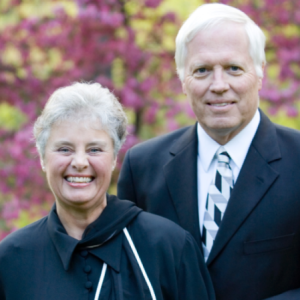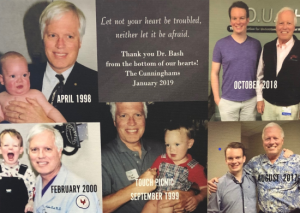Meet Our Medical Advisory Board Member Dr. Sarah Sobotka
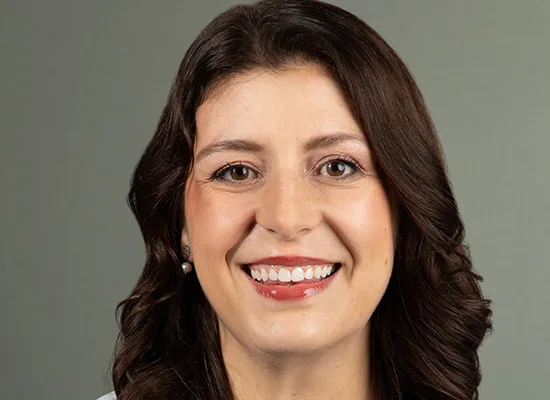
“My hope is that what I bring to DSCC… are the data points that help to drive advocacy and improvements in care.”
Dr. Sarah Sobotka first started working with the Division of Specialized Care for Children (DSCC) through her research to improve support for children with mechanical ventilators and their families.
“I have been working with DSCC as a critical partner in my research program since 2017,” she said, noting how DSCC helped recruit eligible families for her research studies.
“I am so fortunate to have had the enthusiastic support from DSCC because our missions are so aligned and from a research standpoint, it allows me to work with a state agency that lacks the bias of a single hospital center or a single institution… it is a more balanced sample, working with the entire state.”
Sobotka and DSCC share the same goal to better understand the needs of children with medical complexity and connect their families with the right services and support to achieve their best quality of life.
In 2020, DSCC’s leadership invited Sobotka to join our Medical Advisory Board as an expert medical provider.
Her research and expertise provide valuable perspectives on how to best allocate resources and improve systems of care for all Illinois children and youth with special healthcare needs.
An early focus on children with medical complexity leaving the hospital
Sobotka is an Associate Professor of Pediatrics, Section of Developmental and Behavioral Pediatrics, and Ambulatory Medical Director of Comer Developmental and Behavioral Pediatric Programs in the Department of Pediatrics at the University of Chicago.
She became interested in children with medical complexity while completing her residency.
“I did my pediatric residency, and then I elected to do a developmental and behavioral pediatric fellowship in order to focus on the diagnosis and support of children with disabilities and their families,” Sobotka said.
She quickly saw how long children with medical complexity and undiagnosed disability spent in the hospital.
“I recognized early on that an impediment to their flourishing and to their families’ functioning was the length of time they were in the hospital,” she said. “So, some of my early work focused on that process of discharge and the many components that have to get together in order for a child with medical complexity, particularly kids with ventilators, to leave the hospital.”
As part of Dr. Sobotka’s training, she took an additional year between her third and fourth year of medical school to complete a Master of Science for Clinical Professionals. This advanced degree gave her training in epidemiology and research.
Sobotka’s research focus has explored what happens after children with complex medical needs leave the hospital, what the home nursing landscape looks like and what individual families’ experiences and needs are.
One of Dr. Sobotka’s first research studies involved interviewing DSCC Care Coordinators, skilled private duty nurses, and parents of children in the Home Care Program who came home with a ventilator.
“I interviewed those parents a couple of times after going home, so I really started to understand the complexity of home care challenges and what that looked like for families,” she said.
This research project identified gaps in therapy services for these children, and Sobotka developed interventions to support their diverse disabilities. She also learned more about how DSCC Care Coordinators support families and what motivates and challenges professionals in this important role.
Improving the healthcare system’s efficiency
Over the last seven years, Sobotka has continued to partner with DSCC on multiple studies. Recent projects include:
- “Disparities in Home Nursing and Hospital Length of Stay for Children with Invasive Mechanical Ventilation: Identifying National Trends and Piloting a Parent-to-Parent Intervention”
- This study includes a parent-to-parent coaching pilot program for families. This pilot program is for families who have a child on a ventilator in the hospital and are awaiting home nursing so their child can be discharged home or have gone home and do not have enough home nursing support.
- This study includes a parent-to-parent coaching pilot program for families. This pilot program is for families who have a child on a ventilator in the hospital and are awaiting home nursing so their child can be discharged home or have gone home and do not have enough home nursing support.
- “Let’s E.A.T! (Eating with Assistive Technology)”
- This study aims to help children with feeding tubes and tracheostomies (trachs) eat by mouth. It is for families who have a child under 3 years old with a feeding tube and trach.
You can read more about these studies on pages 35 and 36 of our FY 2024 Annual Report.
A major theme in Sobotka’s work is improving the healthcare system’s efficiency so that all children, especially those with medical complexity, spend more time in the least restrictive environment at home with their families.
“This ultimately has the greatest potential to improve their developmental trajectory, because although this is a population at high risk for complex disability, I still believe there are opportunities to mitigate the worst disability outcomes with the right interventions at the right times,” Sobotka said.
Sobotka says families’ experiences and feedback direct the course of her research.
As a Medical Advisory Board member, Sobotka enjoys the opportunity to collaborate with other members to advocate for parent caregivers. She also aims to keep families’ needs and priorities at the center of decisions and improvements in the healthcare system.
“My hope is that what I bring to DSCC and also to other investigators, clinicians, and families are the data points that help to drive advocacy and improvements in care,” she said.
Thank you, Dr. Sobotka, for your dedication to improving the lives of children with complex medical needs and their families!
Meet Our Medical Advisory Board Member Dr. Carolyn Foster
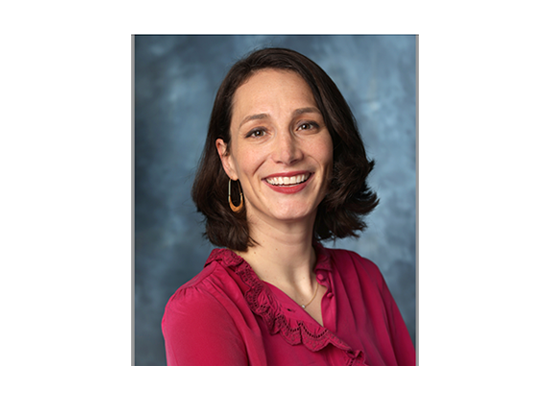
“I want to improve the delivery of care to kids and families who have the most significant medical needs.”
Dr. Carolyn Foster is a physician and researcher who has dedicated her career to improving the care and quality of life for children with complex medical needs and their families.
Therefore, serving on the Medical Advisory Board (MAB) for the Division of Specialized Care for Children (DSCC) was a natural fit.
Foster joined the board in 2020. She brings her perspective as a provider as well as 15-plus years of research focused on home health care for children with complex medical needs.
“I was acutely aware from my own patients of the role DSCC played in helping them,” Foster said. “I felt I could bring my experiences as a health services researcher and my understanding of how we evaluate healthcare services and what we know about kids with complex medical needs.”
Foster is currently an attending physician at Ann and Robert H. Lurie Children’s Hospital of Chicago in advanced general pediatrics and primary care. She is also an assistant professor of pediatrics at Northwestern University Feinberg School of Medicine.
Her research centers on developing and evaluating healthcare delivery interventions and healthcare policies for children with medical complexity and disability. The purpose is to maximize health outcomes for these children and improve how well their family members and caregivers navigate their systems of care.
Foster is particularly interested in improving both the access to and the quality of home and community- based health care for children to help them live safe, independent and full lives at home, school and beyond.
“I had a family member who had a health condition that impacted her experience in the day-to-day world, and it motivated me to be a physician. When I was in training, I appreciated this tool of using health services research to improve how we deliver care,” she said.
“I want to improve the delivery of care to kids and families who have the most significant medical needs. There is an ongoing gap in how we serve that population, so I want to put my effort there… This patient population deserves a voice, and I’m hoping to further emphasize that.”
Foster said she appreciates DSCC’s work to shed light on these issues statewide. She is happy to help advise and cheer on these efforts.
“Having a child who has a special healthcare need or disability or complex medical problem is really challenging because the health care, education and community resources are not always talking to one another,” she said.
“DSCC is one of those key programs in the state of Illinois that really provides an important function in making it a little easier for families by helping with care coordination and getting what they need for their child.”
Learn more about Foster’s latest research study below:
DSCC Partners in Research Study to Improve Home Health Care for Children
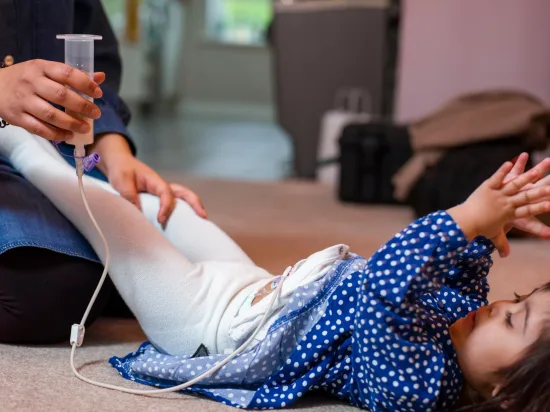
“SafeCare@Home4Kids” aims to understand and prevent safety issues at home for children with medical complexity
The Division of Specialized Care for Children (DSCC) is excited to partner on a new research study to help improve home health care for children with complex medical needs.
The research team is led by Dr. Carolyn Foster of Ann and Robert H. Lurie Children’s Hospital of Chicago. Foster is one of our Medical Advisory Board Members.
Foster and her research team have received a $2 million grant award to fund the study, called “The SafeCare@Home4Kids Learning Lab: Designing Safer Healthcare at Home for Children.”
This study will bring together experts and patient families to better understand how family caregivers and home nurses can help identify, communicate and prevent safety issues at home for children with complex medical needs. The study will use this input to create a digital safety toolkit to help support families.
DSCC Executive Director Thomas F. Jerkovitz said DSCC appreciates this opportunity to partner in the study. He said DSCC will share our team’s experiences with families and home nurses who report safety challenges at home.
Dr. Molly Hofmann, our Director of Care Coordination, Systems Development and Education, is one of the participating experts.
“DSCC plays such a pivotal role in supporting care in the home and… is a repository for safety events,” Foster said. “DSCC also plays such a functional role in creating solutions, so it was pretty clear to me I wanted to have DSCC be a partner in the grant.”
Children with medical complexity need substantial amounts of care to live safely at home. In recent years, their families have taken on increasingly more in-depth medical care at home.
“We send patients home with increasingly more complex medical regimes, and families have expressed to us they didn’t have a clear way to get the support they need when experiencing problems at home,” Foster said.
“A lot of our patients have an artificial airway to help them breathe or they have a g-tube in their stomach to help them eat. If that gets clogged or it falls out or the tubing connected to the machine gets broken, then they can’t get the nutrition they need and they end up in the emergency room. And it’s a life-threatening event at home if their airway isn’t working,” Foster continued. “The idea for the study is we want to find out what are the things leading up to when those safety events occur so we can prevent them.”
“SafeCare@Home4Kids” also wants to help improve communication when medical device and equipment malfunctions happen at home.
“Doctors don’t always know, and families might not know that they should or can tell us about it. They might tell the DME (durable medical equipment company) to get the replacement part, but we don’t know about it, so we keep ordering it for other patients,” Foster said. “It’s both an issue for current patients and also an issue for future patients.”
The study aims to create a better system where families can communicate safety problems at home and know who to notify when they occur.
“One of the problems we recognize is families are scared they’re going to get in trouble. We want to make sure they feel supported to let us know when medical problems are happening at home,” Foster said. “The goal is to move past the reporting safety events to preventing them in the first place.”
The study will also host focus groups to hear directly from families about the safety issues that affect them.
“The goal is to hear from real families on what it’s like day-to-day,” Foster said. “Hopefully it’s the beginning of several projects to support how we’re improving care in the home.”
If you are a family member and would like to participate or learn more about the “SafeCAre@Home4Kids” study, you can email Foster at fosterlab@luriechildrens.org.
We are excited to collaborate with Foster and her research partners on this important project. We’ll share more updates and opportunities to get involved as it progresses.
The project kicked off in September and will continue through July 31, 2027.
Meet Medical Advisory Board Member Dr. Shubhra (Sue) Mukherjee
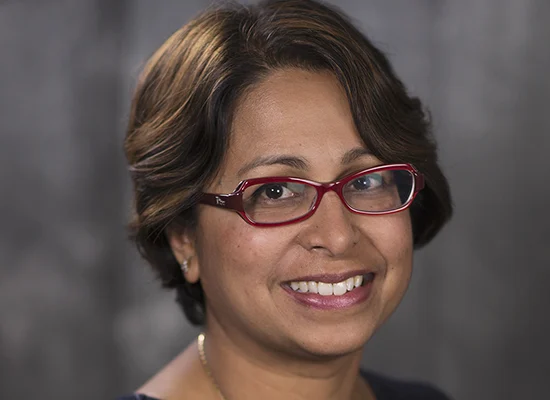
“DSCC understands the importance of supporting families and coordinating care.”
Dr. Shubhra Mukherjee, also known as Dr. Sue, is the medical director of pediatric and adolescent rehabilitation medicine at Shriners Children’s Chicago.
Mukherjee currently cares for patients up to age 22. Her background includes working with young adults with complex healthcare needs and collaborating across medical specialties to help these patients and their families connect with the care they need.
She has served on the Division of Specialized Care for Children’s (DSCC) Medical Advisory Board (MAB) for more than 16 years.
Mukherjee’s expertise in physical medicine and rehabilitation combined with a deep interest in the transition of care for children with complex healthcare needs has been a great fit.
“DSCC understands the importance of supporting families and coordinating care,” said Mukherjee. “I appreciate their statewide focus and how the MAB serves as an avenue for clinician input on what changes are needed, sharing feedback about the struggles we encounter helping patients get what they need, and working together to find solutions.”
Putting the Focus on Transition
When Mukherjee joined the board, schools were just beginning to explore the need to help students build the skills needed to transition to adulthood.
“They were looking at ways they could better prepare students to go on to jobs, college and life after high school,” Mukherjee explained. “In pediatric care, we realized that we needed to be doing the same thing for children with complex healthcare needs and their families.”
The DSCC team had the idea to increase the participation of medical professionals at the annual Illinois Statewide Transition Conference. We wanted to create a more proactive approach to helping children and their families make the transition from pediatric care to adulthood.
Mukherjee teamed up with DSCC’s former Title V Transition Specialist Darcy Contri to help put the idea into action.
“DSCC was already doing great work providing family support, tip sheets, and facilitating face-to-face conversations about transition. This was just one more piece of the puzzle,” said Mukherjee. “Darcy and I set up the first health care track for the Statewide Transition Conference with a goal of building more clinical engagement and increasing awareness and support for patients with complex health care needs and their families.”
The health care track has provided information and presentations with and for doctors and others providing complex care. According to Mukherjee, it continues to be a catalyst for building connections, sparking ideas, and inspiring healthcare professionals.
“I got to see that impact firsthand when one of our occupational therapists (OT) attended the conference with me,” Mukherjee said. “She was so moved that she became a big proponent of the OT’s role in developing and teaching adolescents skills related to health care.”
Opportunities to Collaborate
Mukherjee appreciates how the MAB fosters collaboration, networking and the development of partnerships. This work continues to create more options throughout Illinois for patients with complex care needs.
“It’s very rewarding to grow my knowledge and connect with like-minded professionals across so many different specialties,” Mukherjee said. “We’re able to share, provide feedback, and exchange ideas around removing barriers and supporting patients with complex healthcare needs at all stages.”
Mukherjee said DSCC also continues to be a major source of support for her own patients.
“Care coordination is so important for these families,” said Mukherjee. “DSCC helps them find the right care or specialist, get to appointments, and locate funding for the services they need to stay well and engage in their community. DSCC is there for the child and family.”
Mukherjee also leans on DSCC for updates and information.
“DSCC helps me keep track of program changes and learn about new services or programs that are available,” Mukherjee emphasized. “DSCC plays a vital role in sharing information and connecting the many different entities that individuals with complex needs depend on for their care.”
Awareness Brings Progress
Mukherjee said there is still a great need for education about the transition to adulthood and its importance.
“I’m glad to see the growing awareness and interest by professionals in helping youth develop the skills they need to be successful as adult users of the healthcare system,” said Mukherjee. “We are seeing more adult providers who understand the needs of young people with disabilities who are aging out of pediatric care.”
Awareness has brought progress, but challenges remain.
“Pediatric and adult care are not set up in the same way. For example, a spina bifida clinic and spinal care clinic are similar, but they are not the same. Adults with complex conditions going to a spinal care clinic may not be getting all of their needs met,” said Mukherjee. “The special pediatric clinic that addressed all their needs as a kid doesn’t exist in the adult care system.”
Mukherjee’s own focus on the transition to adulthood remains as strong as ever.
“I’ve been following some of the research initiatives at the University of Illinois Chicago. It’s exciting to see they are collecting data, exploring different aspects of complex care and its costs, and working towards building a framework that brings all the pieces together for adults with complex care needs,” she said.
“DSCC plays a vital role,” Mukherjee noted. “Sharing their information and ensuring it’s always there for the families we serve is important.”
Thank you, Dr. Sue, for your leadership to help families and professionals support the successful transition to adulthood!
Visit our Medical Advisory Board page to learn more about the MAB and its mission.
Meet Dr. Stephen Bash, Our Medical Advisory Board Chair
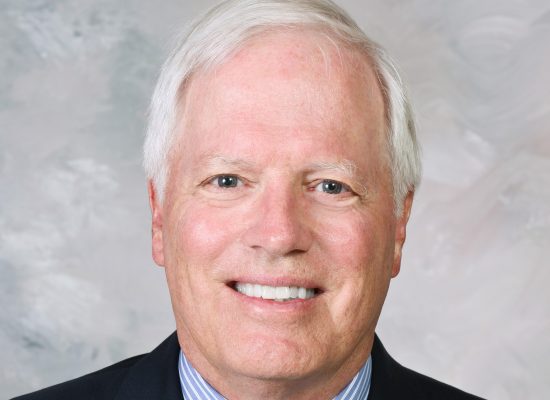
“The help DSCC provides is more important now than it’s ever been.”
Division of Specialized Care for Children (DSCC) Medical Advisory Board Chair Dr. Stephen Bash is a “Hoosier” born and raised.
He attended college and medical school at Indiana University. While doing his rotation at Riley Children’s Hospital in Indianapolis, he fell in love with pediatric cardiology.
“I had completed one year of training, but it takes two years to be board certified for pediatric cardiology,” Bash explained. “I had to make a decision to either continue my training or join my dad at his practice.”
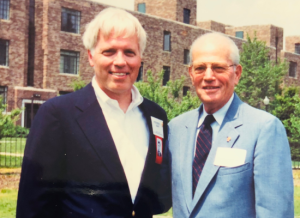
He joined the practice and got hands-on experience treating children with many kinds of complex healthcare needs.
Bash was partially trained and was one of only three pediatric cardiologists in the state of Indiana. For 11 years, he referred his patients, who came from multiple states, to the two specialists he had trained with at Riley Children’s Hospital.
Bash was 40 years old when his dad started to retire.
“So, I figured it was time for a new wife, a Porsche or to go back into a training program,” Bash joked. “I kept my wife, never got a Porsche and completed my training to become a board-certified pediatric cardiologist. Most people do it the other way around, but I completed my academic training after being in private practice for more than a decade as a pediatrician.”
Bash, his wife, Patti, and their four children moved to Houston so that he could finish his fellowship requirements and complete an extra year of heart catheterizations at Texas Children’s Hospital.
Where’s Peoria?
At age 42, Bash was in the job market and fielding offers. Dr. William Albers at OSF Saint Francis Medical Center invited him to Peoria.
“I was invited to visit numerous places around the country. We had Peoria at the bottom of the list,” Bash said. “Patti and I decided we would keep an open mind, look around and talk to people before making our decision. “
The Bashes toured Peoria and found there was a lot to like. He joined OSF Saint Francis Medical Center, where he helped start the Congenital Heart Clinic and connected with DSCC.
“I initially started with DSCC evaluating and accrediting congenital heart program centers in Illinois,” said Bash. “I quickly realized that these centers of excellence were only one piece and began to connect with the other subspecialists in the state.”
It was Dr. Bash who had the dream of starting the Children’s Hospital of Illinois. The hospital eventually grew from 15 pediatric subspecialists in 1985, when he joined the pediatric cardiology group, to 150 pediatric subspecialists. It also underwent a $283 million project that included building a new facility.
In 1986, as Peoria was taking on this project to grow The Children’s Hospital of Illinois, Dr. Albers stepped down from chairing DSCC’s Medical Advisory Board (MAB). He asked Bash if he would like to join the board.
Bash accepted and has been serving in many ways since.
“I will continue to help”
The MAB is a diverse group of healthcare professionals. Each offers a unique perspective on how DSCC can enhance our care coordination services for children with special healthcare needs.
“Over the years I’ve worked with all kinds of subspecialists. I’ve also seen what the families have to go through,” explained Bash. “DSCC’s (program) is the only one that coordinates care statewide and helps steer these families through a confusing maze of insurance changes, seeing all kinds of specialists and understanding their treatment options. The help DSCC provides is more important now than it’s ever been.”
Knowing the many challenges medically complex children and their families face, Bash has focused on breaking down silos and building lasting connections to improve care.
“I began connecting with other doctors and providers in the state. Just like DSCC covers the entire state, Peoria’s pediatric cardiology clinic outreach is also wide-ranging,” Bash said.
“Even if we were competitors, we could still cooperate. For example, OSF could refer transplants to Chicago or St. Louis. Silos don’t work for the families, so creating lasting partnerships to help these families has always been at the forefront.”
Bash said he has always tried to make serving on the board personal because “what you see in a clinic or the hospital isn’t the same as visiting a family in the home.”
“Visiting these families in their homes gave me a much different picture of what they were going through. It was very humbling and not something you will get from your hospital clinic experience. Now, DSCC is there to help these families coordinate care.”
The University of Illinois Board of Trustees appoints DSCC’s Medical Advisory Board members for a three-year term. The MAB membership currently includes pediatric specialists in cardiology, rehabilitation, plastic and reconstructive surgery, neurology and more.
“I am so impressed by our members and all that they do,” Bash emphasized.
“The amazing parent, specialist and staff presentations to the board continue to help us learn about and better understand the different specialties, the many pieces involved in getting and providing care and the ways we can help impact making the services these families need available. We volunteer because we love what we do, and the need is so great.”
Dr. Bash retired from OSF three years ago and continues to enjoy leading the MAB.
“I feel like I’ve lived in the best age of medicine for any physician,” said Bash.
“From the development and mass production of penicillin to the eradication of polio, to the amazing procedures now being done in pediatric cardiology, we’re now doing cardiovascular surgery that I never thought would be possible in such tiny hearts,” he said.
“I’ve had a fabulous career, and DSCC has been an important part of that. There is no question that the needs of these families are very complex. As long as DSCC allows me to, I will continue to help.”
Thank you for your exceptional service, Dr. Bash!
Visit our Medical Advisory Board page to learn more about the MAB and its mission.



